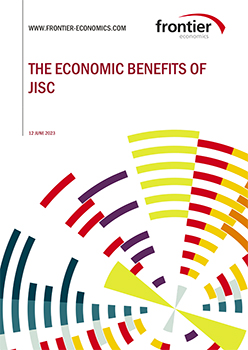The economic benefits of Jisc
Independent research interrogating how Jisc supports and benefits the tertiary education and research sectors, the money we save members and how we generate economic value for the UK.

About the report
Commissioned by Jisc, this report concludes that it helps save the sector up to £300m per year and contributes immensely to the UK economy.
The research finds that, for every £1 they invest in Jisc, members receive a return of more than £3 just in terms of savings.
The report also says that Jisc generates high value for money for the taxpayer, with the wider gross economic benefits associated with its services worth more than £1.5bn per year.
However, because the calculations do not take into account Jisc’s full scope, our true impact on the sector and the wider economy is likely to be much greater.
Included in scope are some of Jisc’s key technologies, in particular our core role operating the super-fast and secure national research and education network (NREN), Janet. It also takes in account our cyber security, trust and identify, cloud and content licensing services.
The research found that for every £1 they invest in Jisc, members receive a return of more than £3 just in terms of savings.
Key findings
The research found that for every £1 they invest in Jisc, members receive a return of more than £3 just in terms of savings.
Benefits to the education and research sectors
Jisc benefits the education and research sectors through:
Connectivity via the Janet Network:
Jisc aggregates demand and delivers the Janet Network at a lower cost than would be possible through alternative providers
Levelling up:
FE colleges in remote areas, with difficult and more expensive access to broadband infrastructure, can get state-of-the-art connectivity via Janet for the same price as all other colleges in the country, which is unlikely to be possible under an alternative provider
Cyber security:
Jisc’s work to prevent breaches saves HE and FE institutions £40m per year in distributed denial of service and ransomware attack incident costs
Cheaper connectivity and cyber security:
Annual savings to members are worth at least £140m versus alternative providers, and do not take account of the fact that Jisc services may offer a higher and more specialist level of protection
Cloud and licensing deals:
Jisc negotiates more than 300 agreements every year on behalf of universities and colleges and, by aggregating the sector’s demand, members can get valuable discounts, terms and access conditions to licensed digital content. Price increases for major publishers are typically kept to 3% or lower in a market where standard price increases are estimated to be 5-6%. Jisc’s members save at least £138m a year by procuring cloud and content licences through Jisc rather than via other providers
Trust and identity:
Jisc members save £13m annually by purchasing the certificate service through Jisc rather than via alternative providers
The research found that for every £1 they invest in Jisc, members receive a return of more than £3 just in terms of savings.
Benefits to the UK economy
Jisc generates economic value for the UK because, in an increasingly digital environment, it enables:
Given the significant external impact arising from education and research activities, a centrally coordinated connectivity model funded partly by the taxpayer is appropriate. A model in which individual institutions procure their own connectivity would be more expensive for each of them and would likely lead to sub-optimal investment and would be more expensive.
